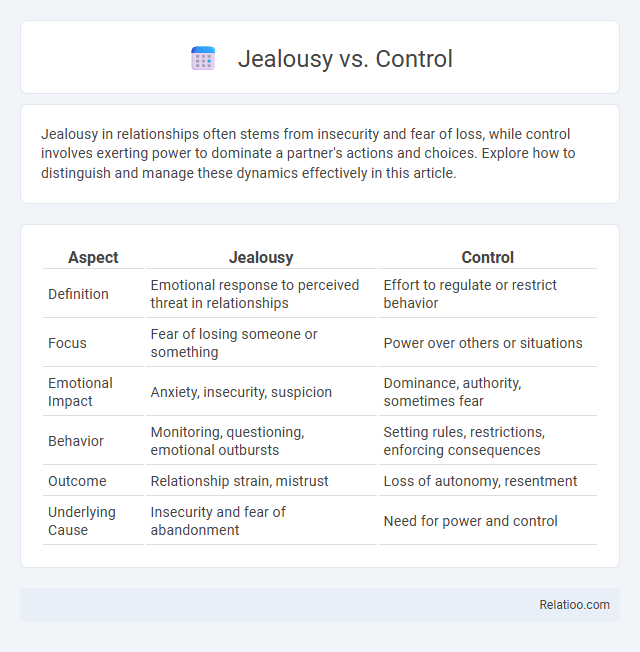Jealousy in relationships often stems from insecurity and fear of loss, while control involves exerting power to dominate a partner's actions and choices. Explore how to distinguish and manage these dynamics effectively in this article.
Table of Comparison
| Aspect | Jealousy | Control |
|---|---|---|
| Definition | Emotional response to perceived threat in relationships | Effort to regulate or restrict behavior |
| Focus | Fear of losing someone or something | Power over others or situations |
| Emotional Impact | Anxiety, insecurity, suspicion | Dominance, authority, sometimes fear |
| Behavior | Monitoring, questioning, emotional outbursts | Setting rules, restrictions, enforcing consequences |
| Outcome | Relationship strain, mistrust | Loss of autonomy, resentment |
| Underlying Cause | Insecurity and fear of abandonment | Need for power and control |
Understanding Jealousy: Root Causes and Triggers
Jealousy stems from deep-rooted fears of loss, insecurity, and low self-esteem, often triggered by perceived threats to your valued relationships. Recognizing these emotional triggers helps differentiate jealousy from control, which involves restricting another's actions, and coercion, where manipulation or pressure forces compliance. Understanding the psychological origins of jealousy allows you to address it constructively rather than letting it escalate into controlling or coercive behaviors.
Defining Control in Relationships
Control in relationships refers to the intentional exercise of power by one partner over the other, dictating their actions, decisions, and interactions to maintain dominance. Unlike jealousy, which is an emotional response to perceived threats, control manifests through behaviors that limit your freedom, such as monitoring communications or isolating you from social connections. Recognizing these coercive tactics is essential for identifying unhealthy dynamics and fostering a balanced, respectful partnership.
The Psychological Impact of Jealousy
Jealousy triggers intense emotional responses that can erode self-esteem and increase anxiety levels, often leading to obsessive behaviors and mistrust in relationships. Unlike control, which is a deliberate exertion of power, jealousy is an involuntary emotional reaction that can escalate into coercion if left unaddressed. Persistent jealousy negatively impacts mental health by fostering chronic stress and impairing communication between partners.
Signs of Healthy vs Unhealthy Jealousy
Healthy jealousy often manifests as mild feelings of insecurity that prompt open communication and reinforce trust within relationships, whereas unhealthy jealousy includes persistent suspicion, obsessive monitoring, and attempts to control a partner's actions. Signs of unhealthy jealousy overlap with control and coercion, such as isolating a partner, limiting their social interactions, or employing emotional manipulation to induce fear or compliance. Understanding these distinctions is crucial for recognizing relational dynamics that either promote mutual respect or escalate to toxic, abusive behaviors.
How Control Manifests in Daily Life
Control in daily life often manifests through constant monitoring of your activities, restricting your social interactions, and dictating choices ranging from clothing to friendships. This behavior can appear as subtle demands for updates, frequent checking of your devices, or overt rules about where you can go and who you can see. Recognizing these signs is crucial to differentiate control from jealousy and coercion, ensuring your personal freedom remains intact.
Differentiating Jealousy from Controlling Behavior
Jealousy is an emotional response to perceived threats in a relationship, often rooted in insecurity or fear of loss, whereas controlling behavior involves deliberate actions aimed at restricting a partner's freedom and autonomy. Unlike jealousy, which is primarily internal and emotional, control manifests through tactics such as monitoring, manipulation, and enforcing rules. Recognizing these differences is crucial for identifying unhealthy dynamics, as jealousy can be a natural emotion but controlling behavior signals abuse.
Emotional Consequences: Victims and Perpetrators
Jealousy often triggers emotional turmoil in victims, leading to anxiety, low self-esteem, and mistrust, while perpetrators may experience insecurity and possessiveness that fuel their behavior. Control exerts a more pervasive psychological impact, causing victims to feel trapped, helpless, and chronically stressed, whereas perpetrators reinforce their dominance through manipulation and intimidation. Coercion intensifies emotional damage, leaving victims with trauma, fear, and a diminished sense of autonomy, while perpetrators typically exhibit aggressive tendencies and a compulsion to overpower others.
Effects on Relationship Dynamics
Jealousy often triggers insecurity and mistrust, undermining emotional safety within relationships. Control manifests as restrictive behaviors that erode personal autonomy and foster resentment between partners. Coercion intensifies power imbalances, leading to fear, diminished communication, and potential relationship breakdown.
Strategies for Managing Jealousy and Control
Managing jealousy and control involves developing self-awareness and setting healthy boundaries to protect your emotional well-being. Effective strategies include practicing open communication to express feelings without blame, fostering trust through consistent actions, and seeking professional support when patterns of control or coercion become harmful. Empowering yourself with emotional regulation techniques reduces impulsive reactions, enabling healthier relationship dynamics.
Building Trust and Healthy Boundaries
Jealousy often signals underlying insecurity, while control and coercion actively undermine autonomy and trust in relationships. Building trust requires transparent communication and respecting healthy boundaries to foster mutual understanding and emotional safety. Establishing clear limits on behavior prevents manipulation and promotes a balanced dynamic where both partners feel valued and secure.

Infographic: Jealousy vs Control
 relatioo.com
relatioo.com